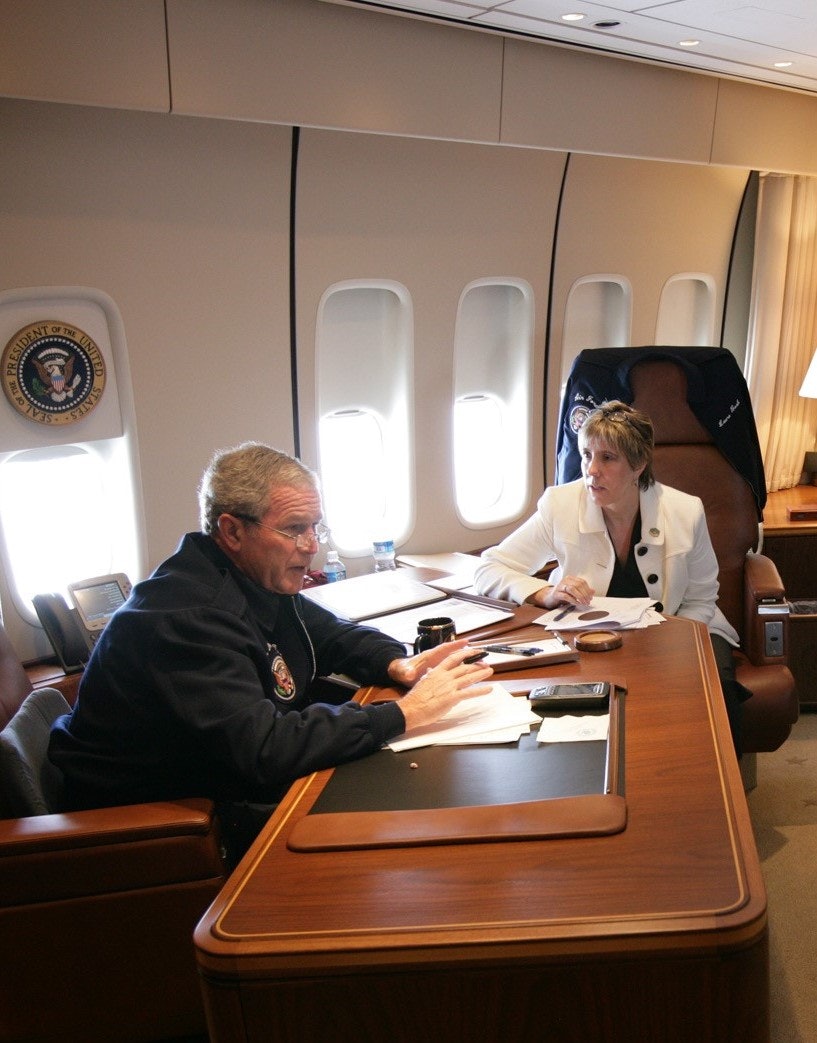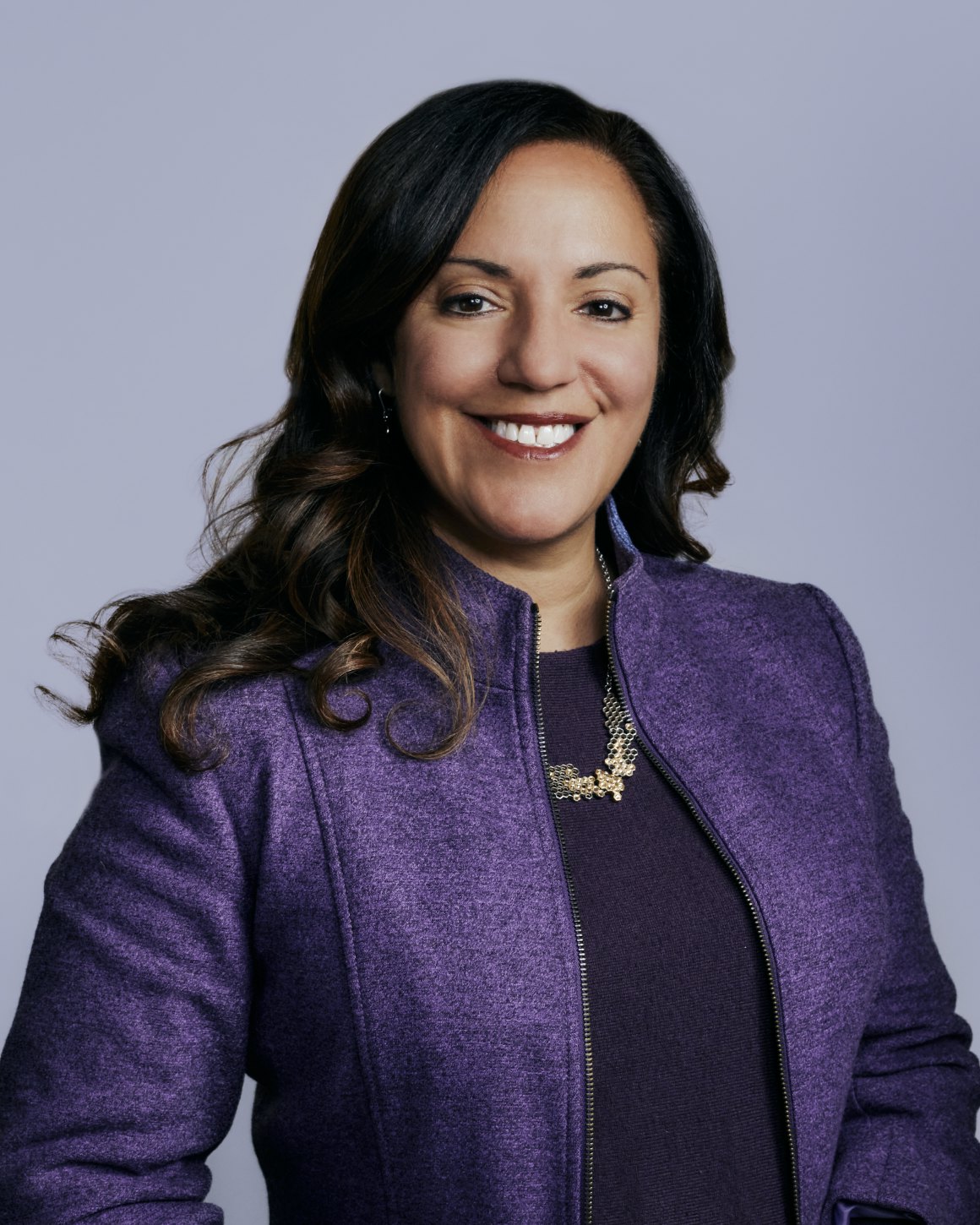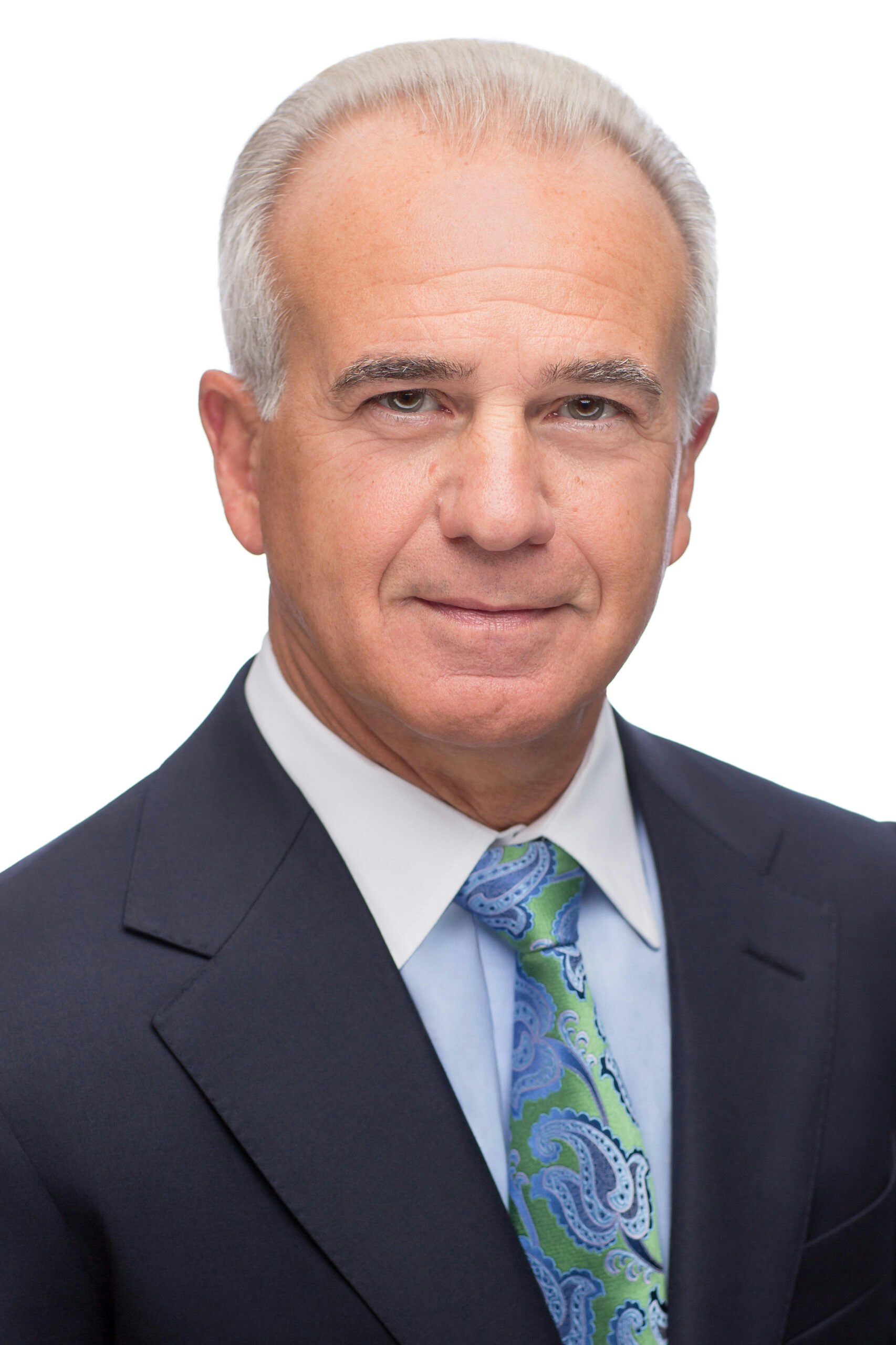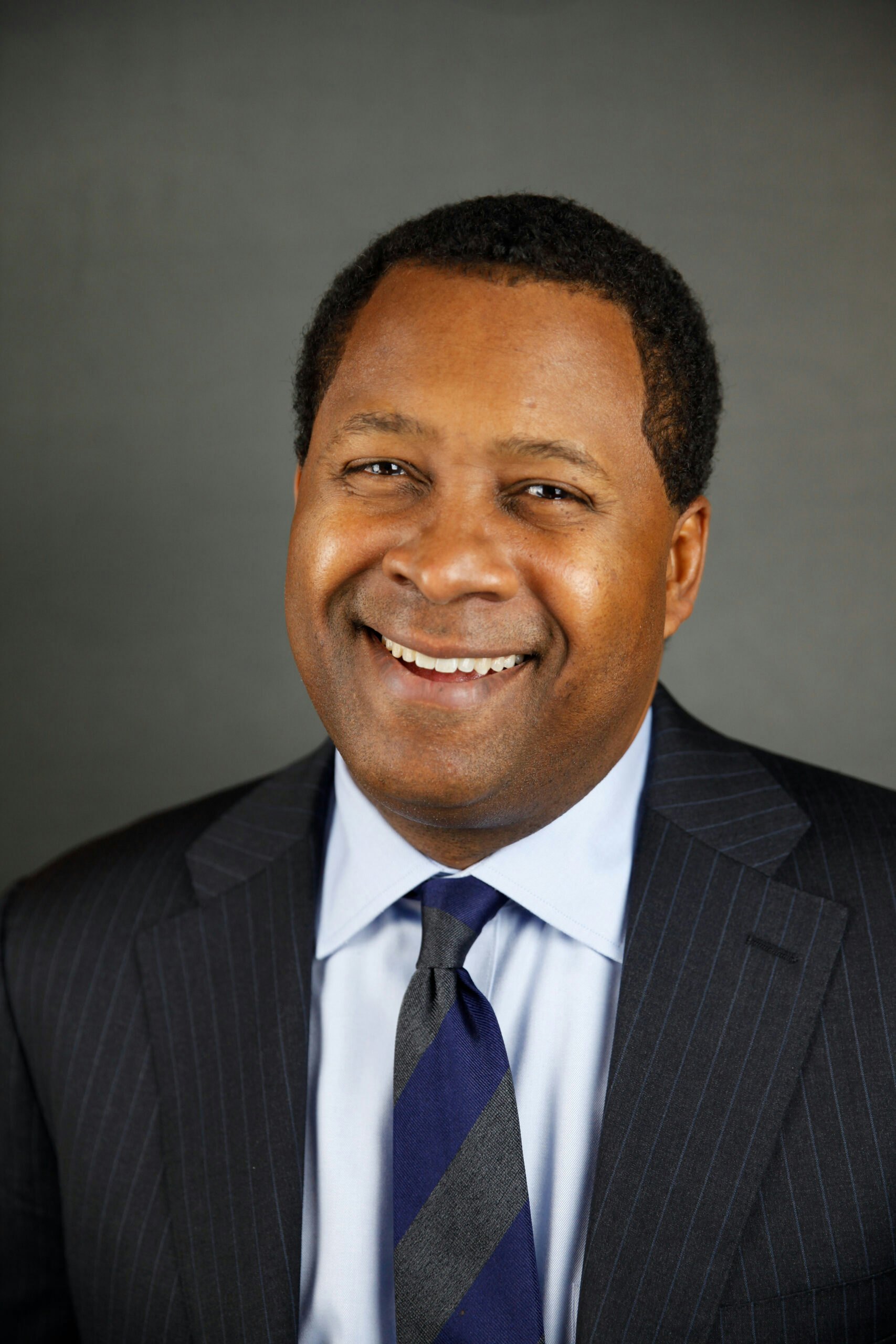Julie Goon joins us this month to talk about her career in health care policy – in corporate settings, on the Hill and in the Administration.
Julie Goon joins us this month to talk about her career in health care policy – in corporate settings, on the Hill and in the Administration. She urges the new Congress to focus on affordability, explains why supporting the nonprofit Bush Center is so important to her, and leaves us with a motorcade story that involves a question from President Bush and a reference to her high school prom.
Q: Tell us about your work at Elevance Health the past nine years and how you are able to use your policy experience in the corporate setting. In what ways is the work fulfilling?
At Elevance Health, I lead teams that are responsible for Government Relations at the state and federal levels, public policy, issues management, external affairs –
including grassroots. coalition and stakeholder outreach – political affairs, intergovernmental relations and business development, along with our company’s thought leadership and public policy research. In the time I’ve been at Elevance Health, we have gone through two corporate rebrands, many acquisitions and a number of leadership changes. What has remained consistent is our mission to be a lifetime, trusted health partner; a mission fueled by our purpose to improve the health of humanity. The company supports consumers, families, and communities across the entire care journey – connecting them to the care, support, and resources they need to lead healthier lives. Elevance Health’s companies serve more than 119 million people through a diverse portfolio of industry-leading medical, digital, pharmacy, behavioral, clinical, and complex care solutions and is the largest health insurer by membership in the U.S.
I have people on the ground in Washington, D.C. and in our 28 footprint states, which include 14 states where we are the Blue-branded insurer and 14 additional states where we hold state Medicaid or other contracts. And since we have members in every state, we oversee all policy and regulatory developments nationwide that may impact the enterprise.
While I joined the Administration mid-career, in 2004, I had so much to learn about how the government operates and how to translate that knowledge to the private sector. Fundamentally, an effective inclusive policy process can drive enterprise buy-in, focus, and successful execution and outcomes. I learned how to think about how different parts of large organizations view their equities in issues and how to ensure their input is solicited, respected, and if there is no consensus, explained so that no one feels they were left out of the process. One of the things I like about working for a corporation is that, like with our Administration, the final decision on a policy direction, especially when there is no consensus, rests with the CEO, and CEOs want to know that their teams worked together across silos to collaborate and align as much as possible, before an issue gets to them.
The White House policy process in our Administration was well-structured and designed to get the right level of decision to the President – we strive to operate the same way at Elevance Health. We work with each of our different lines of business, as well as our enabling functions, to ensure everyone’s voice is heard and when we can’t achieve consensus, to elevate issues up to the CEO.
Q: What recommendations do you have in health care policy for the 118th Congress?
I believe affordability is the most pressing health care issue facing Americans. If you think about access, affordability and quality, this country has made enormous strides in providing access to care and coverage to more and more Americans. And quality is mostly good, although disparities and inequities remain. But the affordability of health care remains a huge issue. Often the focus of affordability is on insurance premiums or deductibles, without an understanding of what makes up those premiums – all the inputs from providers, hospitals, pharmacies, drugs, supplies, etc. I would like to see the Congress focus on some of those inputs. For example, why are hospitals allowed to bill insurers for services provided in a doctor’s office as if they were provided in the hospital, after they have bought the practice? Why has the 340B Drug Pricing Program become such a cash cow for so many hospitals and contract pharmacies, without those lower acquisition costs passed on to consumers?
There is also an increasing level of receptivity to government-based solutions – like the recent drug “negotiation” language from the Inflation Reduction Act. The government will not end up negotiating prices, they will be setting prices, undermining the achievements of Part D. I would like to see Congress really dig into these kinds of issues and figure out how to help or incent the private sector to fix them. They can help shed light on problems, but we shouldn’t always assume every problem needs a government-based solution. My former boss, Al Hubbard, is doing this kind of work in Indiana based on the state’s affordability issues. He established a coalition – Hoosiers for Affordable Health Care – and is encouraging hospitals and insurers to work together to drive down health care costs for Indiana’s employers. While we don’t always have the same perspective, his work is leading to more transparency around affordability.
Q: You have experience on the Hill as a senior policy analyst for the House Committee on Energy and Commerce. With so much tension in D.C., is it still a good idea for young people to get Hill experience early in their careers?
Unlike many people in D.C., I did not work on the Hill as a young person. My career trajectory saw me moving to D.C. at 30 to establish a D.C. office for the company I worked for, then migrating to our trade association to run their lobbying operation. I remember going to Election Night parties on the Hill in 1994 and barely comprehending that I was watching people lose their jobs. If I had moved to D.C. in my 20s, I would definitely have wanted to work on the Hill – it’s such a great place to build a lifelong network of personal and professional friends. And I think the tension, while it is more open and apparent, has always existed and learning how to navigate it and achieve success is a critical skill. So, I would definitely encourage people to work on the Hill. I’m the Chair of the David Winston Health Policy Fellowship Board – a fellowship dedicated to bipartisan policymaking and every year we get so many great applicants who are eager to get that Hill experience.
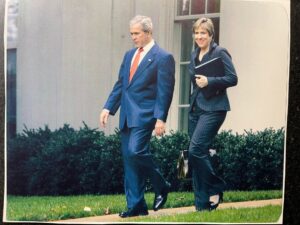 While I didn’t have Hill staff experience when I joined the Administration, I had spent 10 years lobbying and those skills also translated seamlessly into working both at HHS and the White House. Having gone to the Hill after my White House and agency experiences, later in my life and career was also useful, but a completely different experience. It was my observation at the time that if you work for a President/Administration, you have to be accountable for programs or outcomes – people have to get their Medicare claims paid – but that isn’t necessarily the case as Hill staff. For me, I was more comfortable in the Administration environment, but my perspective is colored by the period of my career I was in and by the absolutely extraordinary experience I had working for President Bush.
While I didn’t have Hill staff experience when I joined the Administration, I had spent 10 years lobbying and those skills also translated seamlessly into working both at HHS and the White House. Having gone to the Hill after my White House and agency experiences, later in my life and career was also useful, but a completely different experience. It was my observation at the time that if you work for a President/Administration, you have to be accountable for programs or outcomes – people have to get their Medicare claims paid – but that isn’t necessarily the case as Hill staff. For me, I was more comfortable in the Administration environment, but my perspective is colored by the period of my career I was in and by the absolutely extraordinary experience I had working for President Bush.
Q: You have been a consistent supporter of the nonprofit Bush Center. Why has that been so important to you?
I have been very fortunate in my life. I’m healthy, have a great family, a wonderful network of longtime and new friends, terrific mentors and teachers, a great career. My professional opportunities were enhanced and expanded by the work I was able to do for President Bush and giving to the Bush Center is one way for me to express my appreciation for that opportunity and gratitude for the work we were all able to do together. Like President Bush, I believe in the adage, “to whom much is given, much is required” and I am in a position where I am able to support the Bush Center and happy to do it.
When I joined Elevance Health, I brought my whole team to the Bush Center for our first offsite team meeting. The facility is so well laid out for group meetings and the Center staff were really wonderful and accommodating. And the President agreed to come to our dinner at the Museum, do a moderated Q&A with our CFO and take photos with our attendees. My team has never forgotten that visit and to a person, their photos with President Bush are prominently on display in their offices across the country. That visit was another way to support the Bush Center and its work and to express my sincere appreciation to the President for all I learned working for him.
The work of the Bush Center enables the work we all did together to live on in a very focused way. I think the priorities laid out by the Bush Center help remind us of the good we did, the mission we had, and that the work continues. It is important to me to know I am one small piece of that work.
Q: Can you leave us with a favorite story or moment from your time in the Administration?
There are so many great memories I have of working in the Administration – both at HHS and in the White House. I was at HHS during the roll-out of the Medicare Part D benefit and traveled all over the country with Secretary Leavitt and CMS Administrator Mark McClellan doing education and enrollment events and then ensuring that any initial problems were fixed. The Medicare Part D program is the most successful public sector health care program implemented – and a critically important program for American seniors.
But my favorite stories all have to do with my time on the White House staff – briefing the President, taking guests on West Wing tours, bringing my family in for parties or arrival/departure ceremonies, traveling for the President, running into the President in the OEOB elevator – and the stories have gotten better over the years.
I remember the first time I had to brief the President for an event. Josh Bolten, Joel Kaplan, Tony Fratto, Al Hubbard and Kevin Sullivan were all in the Oval with me. After Sully did the initial rundown of the event, there was some back and forth between me and the President that went well enough that I was invited to ride in the limo – the “Beast” – on the way to the event. I did not know that while I would be in future motorcades, this would be the only time I was in the limo, and it may have only been once because of this anecdote, but I have a terrific photo of me walking to the motorcade with the President. He, making polite conversation, has just asked me if I had ever ridden in a limousine before and I quickly responded, “Well, sir, I did go to my prom.” He then concluded with “smile, you’re on television.”

